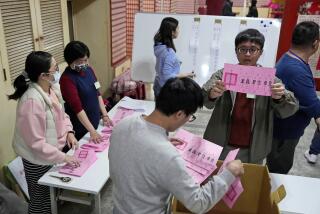Turmoil In China : The Struggle for Power : Beijing’s New Target: The Fax Machine
- Share via
HONG KONG — China’s apparatus of political repression took aim Sunday at one of the principal tools of the pro-democracy movement: the fax machine.
Chinese government radio broadcasts monitored by Hong Kong Chinese here asserted that police and security officials are now sitting by and keeping watch on all the fax machines inside China. The implication was that any resident of China who shows up to receive material faxed from Hong Kong or anywhere else outside China could get into serious political trouble.
For good measure, Chinese radio broadcasts also ordered all citizens to turn in to authorities all the Hong Kong newspapers they have in their possession. Hong Kong newspapers should not be found lying around the homes or apartments of people inside China, the government broadcasts warned.
Effort to Limit Information
The broadcasts represent the strongest effort yet to limit the information that the Chinese people receive from outside the country. They also illustrate the way China’s security apparatus is now scrambling to cope with modern technology as it carries out an old-fashioned political crackdown.
Throughout the past few weeks, many fax machines inside China have been running virtually non-stop. Residents of Hong Kong, in particular, have been sending in messages of support, as well as news and copies of foreign press coverage of the events inside China.
“Fax Saves Lives,” says one sticker plastered onto virtually every lamppost in this politically charged city.
Fax machines at Hong Kong University here are said to have been used to provide important logistical and organizational support for the pro-democracy movement inside China when it was at its peak.
From a political standpoint, the advantage of the fax machine is that it is relatively secure. It is much harder to intercept fax messages than it is to eavesdrop on telephone calls or to monitor conversations inside a room through electronic bugs.
Even if Chinese security officials intercept the signal from one fax machine to another, diplomats say, they would not be able to decipher it unless they are actually present to take the paper as it comes out of the machine.
That is what the Chinese radio broadcasts suggested that the police are trying to do.
No one seems to know how many fax machines there are inside China. During the past few years, many of them have been brought in by private companies, universities, research institutes and state enterprises.
“The fact that the police say they are monitoring every fax machine in China is ridiculous,” one Western diplomat said here Sunday. “They couldn’t possibly keep track of every fax machine in China every day.”
Among the materials most frequently transmitted by facsimile from Hong Kong into China have been copies of news articles in the Hong Kong press. According to Sunday’s radio broadcasts, these are now considered off-limits to ordinary Chinese, either in their facsimile form or in their original newsprint versions.
During the past few weeks, even those Hong Kong newspapers supposedly controlled by the Chinese government have turned against the regime and published scathingly critical stories about the events in Beijing.
Since the June 4 massacre in Beijing, the Wen Hui Bao--which was for decades one of the leading pro-Communist newspapers in Hong Kong--has switched the color of its masthead from red to black. In a June 5 editorial, the newspaper said that the hard-line faction of the Chinese Communist Party led by Premier Li Peng and President Yang Shangkun were “thieves” who had completely turned against the Chinese people.
On Sunday, the newspaper published two front-page pictures of Chinese troops beating young people.
In the past, the Wen Hui Bao and two other Hong Kong newspapers affiliated with the Chinese Communist Party were distributed liberally in China. Now, according to Sunday’s radio broadcasts, residents of China are being told not to read them.
It is not clear what will happen to the newspapers, which are believed to get financing from the Chinese government.
More to Read
Sign up for Essential California
The most important California stories and recommendations in your inbox every morning.
You may occasionally receive promotional content from the Los Angeles Times.













